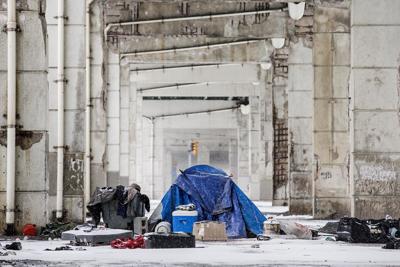If this is to be the start of a new şŁ˝ÇÉçÇřąŮÍřtradition, it’s a brutal one. For the second year in a row, the City of şŁ˝ÇÉçÇřąŮÍřunveiled its winter homeless shelter plan by acknowledging the insufficiency of the measures it plans to take. That’s a depressing press conference: Here’s the plan! It ain’t going to work!
It looks like planning for failure — when the stakes are whether people freeze on the street or not — but, believe it or not, as I wrote last year, it is progress. The old annual tradition involved failing to draw up a proper plan at all and then being shocked when there wasn’t enough space in the shelters, and then vowing to do better next year when people froze to death, and then promptly forgetting about it when it came time to set budgets.
Observing this, I’ve had my own annual tradition of writing that we need to do better. Since the era of former mayor Barbara Hall, the city’s policy shelves have teetered under the weight of reports saying we need more short-term shelter beds and more long-term supportive and social housing. All along, we’ve fallen short of providing both.
Traditionally, my own conclusion has been to decry that our leaders haven’t done anything even though they know what to do.
But this year I’m not so sure. Because our leaders have been doing things.
In — which includes emergency shelters and programs to get people off the street and into stable housing — was $172 million. By , spending on those programs had grown to $789 million.
In 2014, the same budget documents note that the emergency shelter system provided beds to 3,941 people per night. City staff shared information with me showing that this month, the shelter system is accommodating 12,200 people per night — 9,788 in shelter beds and the rest in “bridging hotels” rented by the city to meet the overflow.
Plus, city numbers show just under 3,000 people have moved out of the shelter system into housing this year so far — in total, the city has tracked 39,229 people moving from shelters into permanent housing since 2018.
A decade ago, there were just over 3,900 people in shelters, and in that time the city has moved more than 10 times that many people into permanent housing, more than quadrupled the budget for shelters and more than tripled the amount of people being sheltered each night.
And still, here we are: There are more homeless people than ever, and we don’t have enough places for them to stay.
Refugees are a big part of the story of why, despite what appear to be significant efforts, the city has not been able to keep up. According to , the number of refugees in the shelter system has gone from 3,000 to 6,000 just within roughly the past year. That was certainly part of the story my colleague Victoria Gibson told earlier this week about the horrifying number of children in the shelter system (nearly 3,000 of them as of last month, roughly six times as many as in 2016, and triple the number from 2020).
But another big part of the story is just that the rent in şŁ˝ÇÉçÇřąŮÍřis too damn high. There aren’t enough places to live, and what places there are end up being crushingly expensive. In one of her stories on kids in shelters, Gibson spoke to a mother of three who had been on a subsidized housing wait-list for eight years, and couldn’t get a private apartment because of her low-income and bad credit.
At the TMU Forum when pressed by Cohn, Chow tried to emphasize what the city is doing (rent supplements, building shelters, supporting refugee settlement agencies) while acknowledging it is hard to make it happen fast enough. Right now, the city is constructing eight new emergency shelters. But they won’t be built this winter.
While the city scrambles, again and still, to increase the supply of shelter spaces, what seems obvious is we need an equally urgent emphasis on reducing the ballooning number of homeless people. More housing. More affordable housing. More carefully considered refugee settlement programs. More support in keeping people housed. More economic support in general.Â
According to the mayor, it costs $7,000 a month to house a family in a “bridging hotel” through the shelter system. How much cheaper and easier and more humane would it be to provide them rent support before they become homeless?
Maybe there is no quick fix, but that is no excuse to stop looking to fix things. We appear to have no way to serve all the people needing shelter this coming winter, which is inexcusable. What would be worse would be to hesitate any further on doing the things that will make future winters better.Â
Error! Sorry, there was an error processing your request.
There was a problem with the recaptcha. Please try again.
You may unsubscribe at any time. By signing up, you agree to our and . This site is protected by reCAPTCHA and the Google and apply.
Want more of the latest from us? Sign up for more at our newsletter page.




















To join the conversation set a first and last name in your user profile.
Sign in or register for free to join the Conversation